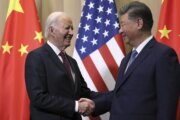Apple Inc. (ticker: AAPL) continues to hold the world’s attention as the most valuable company in the world, having taken the top spot in 2011 and kept at or near the top for most of that time. Apple was the first company to reach a market capitalization of $1 trillion in 2018. Now, it leads a grouping of six additional companies that have eased into a trillion-dollar-plus valuation.
[Sign up for stock news with our Invested newsletter.]
Each of these companies have had to overcome a slew of global obstacles, including continued pandemic recovery, worker needs and demands, supply chain challenges and the economic complications from the Russia-Ukraine conflict, while taking advantage of the quickening pace of technology, especially in the artificial intelligence realm. Additionally, they are facing pressure for climate sustainability and social credentials to satisfy a broader range of global needs and individual perspectives.
The 10 most valuable companies in the world for 2023 by market capitalization are:
| Company | Market Capitalization (as of June 14) |
| Apple Inc. (AAPL) | $2.89 trillion |
| Microsoft Corp. (MSFT) | $2.51 trillion |
| Saudi Arabian Oil Co. (2222.SR) | $2.18 trillion |
| Alphabet Inc. (GOOG, GOOGL) | $1.57 trillion |
| Amazon.com Inc. (AMZN) | $1.3 trillion |
| Nvidia Corp. (NVDA) | $1.06 trillion |
| Tesla Inc. (TSLA) | $813.9 billion |
| Berkshire Hathaway Inc. (BRK.A, BRK.B) | $734.4 billion |
| Meta Platforms Inc. (META) | $700.52 billion |
| Taiwan Semiconductor Manufacturing Co. Ltd. (TSM) | $554.75 billion |
Taiwan Semiconductor Manufacturing Co. Ltd. (TSM)
One of only two international corporations on the top 10 list, Taiwan Semiconductor Manufacturing is Taiwan’s most valuable company and is headquartered in Hsinchu, Taiwan. The central government of Taiwan is its their largest shareholder, with a wide roster of foreign investments completing the ownership roster. With its status as the world’s most valuable semiconductor company, it works with many key global firms, including Apple and Nvidia on this list. Its goods allow consumers to utilize electronics, automotive, communication and computing applications. The company was founded in 1987 by Morris Chang. In 1987, Taiwan Semiconductor was listed on the NYSE, the first Taiwanese company to be afforded this status.
Meta Platforms Inc. (META)
Originally known as Facebook Inc. and TheFacebook Inc., Facebook began in 2004 at Harvard University in Cambridge, Massachusetts, with Mark Zuckerberg and four fellow students. META was the culmination of a complete corporate rebrand in 2021. As a popular social media site, META derives an overwhelming majority of its revenue (97.5%) from advertisements on its multiple platforms: Facebook Instagram, Messenger and WhatsApp.
Meta Platforms’ focus is the metaverse, an immersive virtual experience where users come together to connect and be entertained as they are in the real world. The metaverse would enable users to experience social media content, online gaming, and both augmented and virtual reality experiences. Ultimately, users are expected to be able to browse and shop using a virtual “trying on” experience to determine whether a purchase will look and feel as they anticipate. Cryptocurrency would also potentially enable monetization of these experiences.
Berkshire Hathaway Inc. (BRK.A, BRK.B)
The oldest company on our top 10 list, Berkshire Hathaway was the culmination of a series of mergers. Initially, the Valley Falls Company in Valley Falls, Rhode Island, began in 1839 under Oliver Chace and merged 50 years later with the Berkshire Cotton Manufacturing Company to form the Berkshire Fine Spinning Associates.
A merger with Hathaway Manufacturing Company in 1955 enabled the new firm to survive into the next decade despite the downturn in textiles. By the mid-1960s, the firm was about to go out of business. The Oracle of Omaha, Warren Buffett, started accumulating shares, and after feeling slighted by then-CEO Seabury Stanton with a lowball offer to be bought out, Buffett turned around and bought control of the company.
Buffett was known for his diligence as a value investor, and Berkshire Hathaway was selling far below its working capital. What should have been a smaller investment ended up becoming an outright purchase, a move that Buffett ultimately regretted.
However, it was one of the first investments of Buffett’s transition away from his Buffett Partnership, setting the stage for his continued success. As chairman and CEO, Buffett has run Berkshire Hathaway with the same due diligence, long-term patience and integrity that continues to rain accolades on him, both personal and professional. The multinational conglomerate earns capital through the sale of insurance (most notably Geico and reinsurance giant Gen Re) and then diversifies the earnings over about 60 companies, including brands such as NetJets, Clayton Homes, Acme Brick Co., See’s Candies and the Burlington Northern Santa Fe railroad, and alongside partial investments in Coca-Cola Co. (KO), American Express Co. (AXP) and Pilot Flying J.
Tesla Inc. (TSLA)
Tesla, created in 2003 and now headquartered in Austin, Texas, topped our list of the 10 most valuable car companies in the world earlier this year. It made an early bet on electric vehicles and continued to advance the concept through innovations in both battery life and distance, giving it an 18% share of the EV market.
Tesla is the first automaker in the U.S. to sell cars directly to consumers (where regulations allow) or through educational galleries. Tesla’s brand is so well regarded that it is also the only automaker that has no paid advertising campaign.
Its geographic positioning for superchargers gives it first-mover status among consumers who are concerned about battery range and infrastructure. In late May 2023, Ford Motor Co. (F) and General Motors Co. (GM) notably adopted Tesla’s North American charging standard as the de facto charging platform standard.
Price reductions of its models have enabled Tesla to appeal more meaningfully to mainstream consumers. As the EV market evolves, Tesla has continued to move into additional consumer services, such as auto insurance. Tesla Energy, a subsidiary, manufactures solar energy hardware, such as solar roof tiles, solar panels and Powerwall, an integrated stationary battery system.
Nvidia Corp. (NVDA)
Bringing up the last of the current companies in the $1 trillion-plus club, tech company Nvidia began in 1993 in Santa Clara, California, as a developer and manufacturer of graphics processing units. GPUs were originally used for video gaming and PC graphics, but more powerful versions are deployed in supercomputing applications. However, they have exploded in growth as their GPUs are increasingly being used for cryptocurrency mining centers that validate digital currency transactions.
In addition to GPUs, Nvidia produces application programming interfaces (APIs) and automotive and mobile computing system-on-a-chip units (SoCs). Nvidia is also becoming a powerhouse in artificial intelligence hardware and software systems.
In 2020, it announced plans to build a high-power computer, the Cambridge-1, to support health care research in the U.K. In 2023, the Cambridge-1 was linked to the Nvidia DGX Cloud so that any enterprise across the globe could access its supercomputing resources from a regular browser.
Amazon.com Inc. (AMZN)
Amazon was founded in Bellevue, Washington, in 1994 in Jeff Bezos’ renovated garage as an online marketplace for books. From there, Amazon exploded into a logistics and technology behemoth known for its e-commerce, Amazon Web Services cloud computing, digital streaming and book publishing empire. Amazon also owns Whole Foods Market, IMDb.com, Ring home security devices and Zoox, an autonomous vehicle company, among other subsidiaries.
It continued its growth with its integration of artificial intelligence throughout its operations. Amazon has become the largest online retailer in the world, with over 200 million users worldwide.
[SEE: 5 Best Tech ETFs to Buy in 2023]
Google, based in Mountain View, California, was founded in 1998 by Larry Page and Sergey Brin. In 2015, Google was restructured in the words of Page, to “form a cleaner and more accountable and better” company and allow Google to more efficiently broaden beyond its primary product line. The initial result was Alphabet, as a subsidiary of Google. But the company then reversed these roles so that Alphabet became Google’s parent company alongside its other multinational subsidiaries.
Google is most famously known for its search engine, but shares Alphabet’s extensive R&D capabilities with services for Android operation systems, smart speakers and Pixel smartphones. Google also offers several popular products, including Gmail, YouTube and the navigation apps Waze and Maps.
Saudi Arabian Oil Co. (2222.SR)
Saudi Arabian Oil, also known as Saudi Aramco, is based in Dhahran, Saudi Arabia. The Saudi Arabian government, including the Saudi royal family and the country’s sovereign wealth fund, owns 98.2% of the company. Saudi Aramco holds the world’s second largest proven crude oil reserves and produces three times more than its closest competitor, PetroChina Co. Ltd. (PCCYF).
This monopoly comes as a result of its ownership of the world’s largest onshore — Ghawar — and offshore — Safaniya — oil fields. Also included in its portfolio is the Master Gas System, the world’s largest single hydrocarbon network.
The firm trades in Saudi riyals on the Tadawul stock exchange, which is owned entirely by the Saudi sovereign wealth fund. Saudi Aramco started trading in December 2019. It immediately exceeded the $1 trillion USD market cap threshold and crossed over the $2 trillion threshold on its second day of trading.
While its market cap is highly dependent on the price of oil, it has diversified with power generation and water desalination activities. Additionally, it is seeking further diversification through the mining of an estimated $1.3 trillion in phosphate minerals as well as other necessary minerals needed for clean energy production.
Microsoft Corp. (MSFT)
Microsoft’s Windows operating system has long been the preferred choice in the business marketplace. Windows runs on nearly two-thirds of desktops worldwide, with Apple’s macOS coming in second at 19%, as of May 2023, according to StatCounter. That number is down from over 74% at the start of the year, but still a comfortable lead.
However, Microsoft also has a wide ranging portfolio, including its Office software suite, Edge web browser and hardware such as Surface touchscreen personal computers and Xbox video game consoles. Through acquisitions, it also owns LinkedIn, Bing, the Azure cloud platform and other strategic interests. Headquartered in Redmond, Washington, Microsoft was founded by Bill Gates and Paul Allen in 1975 and crossed the $1 trillion-market-cap threshold in April 2019.
Apple Inc. (AAPL)
Apple has been a clear winner for many years because it has made its products consumer-intuitive and its service consumer-friendly. In a story that most people know, the tech giant was founded in Cupertino, California, in 1976 by Steve Wozniak, Steve Jobs and Ronald Wayne. While initially marketing the Apple I personal computer, they found their footing with their second iteration, the Apple II, allowing them to go public in 1980.
Since then, Apple’s rise has been meteoric, claiming the first $1 trillion market cap in 2018, then $2 trillion in 2020 and $3 trillion in 2022 before settling in just under the $3 trillion mark. Apple’s product lineup includes smart devices — iPhone, iPad and Watch — and MacBook computers, AirPods, the App Store and iCloud services. AppleTV+ is a streaming service showcasing Apple’s original programming.
More from U.S. News
8 Best Fintech Stocks to Buy in 2023
Vanguard vs. Fidelity: Which Is Better for You?
5 of the Best Travel Stocks to Buy for Travel Season
The 10 Most Valuable Companies in the World by Market Cap originally appeared on usnews.com







